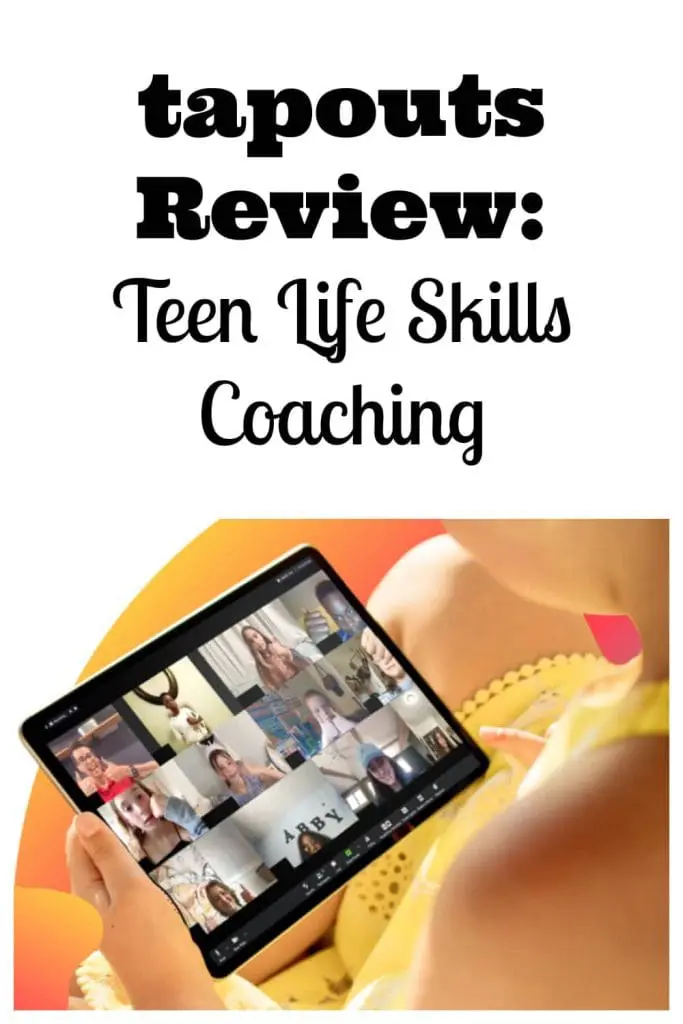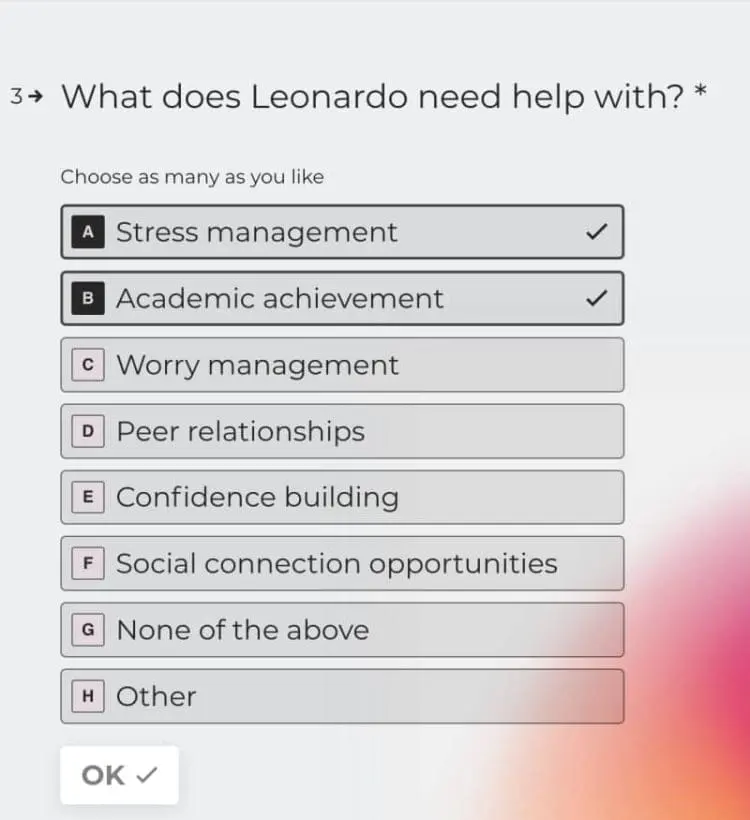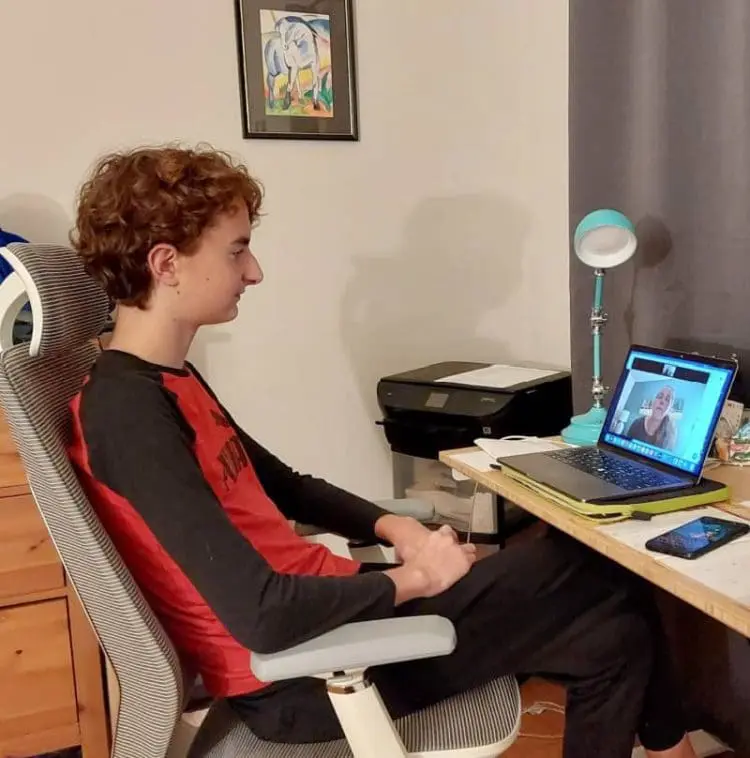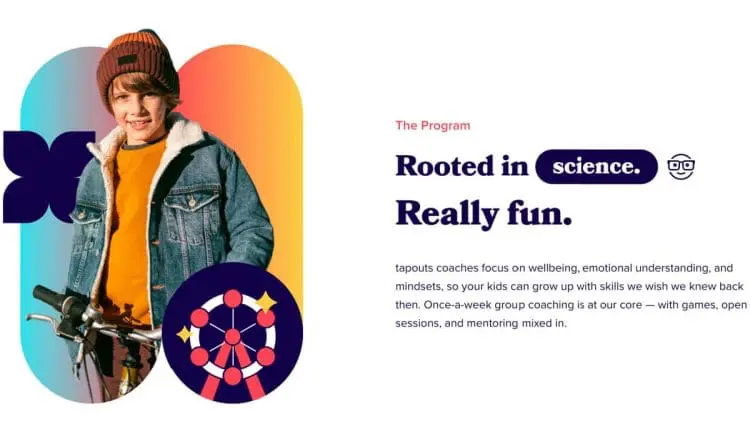As a parent, I have always considered the well-being of my children to be my first priority. The many different facets of that seem to be constantly changing as children grow and develop. Ultimately we just want to have well-adjusted kids that can be happy and resilient as they go out into the world. That is why I am pleased to partner with tapouts, a virtual live group coaching platform for children and teens. My son is 15 so I know there are a lot of new things that teenagers are encountering and that they need to master before they leave the home. Working with a teen life skills coach and pod of teens can help them stay positive and learn stress management skills. tapouts offers a fun e-learning platform intended to teach young people skills they don’t learn in school.

What Is tapouts Coaching?
tapouts is a live coaching program for kids and teens. It covers emotional intelligence topics that kids don’t always learn in school. However, they still need them to be successful in life. Their science-backed approach fosters mental wellbeing, emotional understanding, and a growth mindset. The tapouts sessions cultivate skills necessary for resilience while helping kids to have fun and make new social connections. tapouts provides once-a-week group coaching sessions. Included in these meetings are check-ins, games, mentoring, and educational units on life skills. And it’s all accessible online from anywhere.
There is a solid group of experts behind the tapouts program structuring and creating an environment for teen emotional development. The co-founder and CEO of tapouts, George Moringer, has a vision to build a safe space for kids to become confident and resilient and grow into well-adjusted adults. Dr. Daniel Lee is the Director of Program and Coaching and he brings over 20 years of experience working with youth and their families in settings including the Los Angeles Unified School District, LA County Department of Mental Health, educational centers, and nonprofits. Just as life coaches can have a profound influence, the supportive environment that tapouts creates can have a positive effect on children’s mental health.
How Does tapouts Work?
The parent can use a free assessment quiz (it just takes 2 minutes). The results are used to pair them with a teen life skills coach or a life coach for kids, depending on their age. The coach then meets with your child in a brief 1 on 1 zoom call to introduce themselves, learn about your child, and to tell them about the program and how it works.
Next, your child meets once a week in a Zoom meeting with the teen life skills coach and a pod of peers. This is a perfect set up with the knowledgeable coach to guide the session and the peers to make the interaction more fun and meaningful. There are mountains of evidence showing that building strong relationships and developing emotional regulation helps reduce the chances of risky behaviors and serious mental health issues.
Life Coach For Teens Review
My son, Leonardo, and I were provided with access to tapouts in order to facilitate our review. The sessions provided welcoming environments to discuss various topics from academic performance to responsible decisions.

Assessment And Life Coach Match Up
First, I used the short assessment tool. There were questions about his age and his behavior at home and at school. There were also questions about general areas where he may have opportunity to improve his skills.
He was then matched to a life coach for teens. He met 1 on 1 with her and I watched to see how it would go. The coach was extremely friendly and positive. She introduced herself and shared that she is both a teacher and a mother herself. She asked a few questions to get to know Leo. The coach also explained how the sessions would go. She assured Leo he could share as much or as little as he wanted. The coach stated the rules about being respectful and keeping the camera on during the sessions so they can all interact. She also asked some questions to determine Leo’s interests, check his stress levels, and to see what he does for stress relief.
At a later date, he had his first group coaching session. Children and teens participate in a weekly 30-minute session that considers age group and interests. Below, I will give you a more detailed look at one coaching session. All coaching sessions will be different but this will provide you with an example.

Live Group Coaching Session Review
The coach was super positive and encouraging. She had everyone introduce themselves to the group and she asked follow up questions from things they had talked about the previous week. In this way, your child is really making a social connection to both the coach and the peers. They discussed highs and lows from the previous week. For example, one boy mentioned his high was asking a girl out for the first time. Another teen mentioned her low was being sick and missing school. Right away you can see how the teens can learn from each other and empathize with each other in this structured sharing environment. The coach meanwhile was reacting in a guiding way to the things they shared. For example, she asked the girl if she was getting her work and expressed that she was proud of the girl for trying to stay caught up.
The teens also played a trivia game with their coach. They answered questions like “How many thoughts do most people think in a day?” Then this game served as a segue to discuss ANTs (Automatic Negative Thoughts). They talked about the fact that everyone has ANTs. We all have to learn how address them or change our thinking. She discussed how ANTs can effect our emotions and how our emotions can effect our behaviors.
The life coach read out a very detailed, relatable example. It was of a boy at school who needed to give a class presentation and was experiencing several ANTs. She asked the group participants to identify the ANTs that they had heard. She asked the kids of any of them had ever felt that way. I think it was a fantastic experience for them to all see they are not alone with these types of critical thoughts. It was important for the teens to hear that having ANTs does not make them true. She talked about big ANTs that use words like always, never, and every time. She discussed the importance of noticing these clue words and identifying that they aren’t really true.
The session coach asked the students to share ways that they could handle the stress of a presentation in a more productive way that may help them avoid big ANTS. They discussed how planning ahead and breaking things into steps allows you to be more prepared. They also discussed how practice helps you to gain confidence and avoid automatic negative thoughts.
The life coach for teens gave them all a short, easy homework assignment. They were asked to track their thoughts this week and notice when they are having ANTs. Also, to notice if they have any big ANTs.
The group coaching session ended with a chance for the teens to provide feedback on the session, topics, and teacher.

The Value of Life Coaching For Teens And Kids
Let’s face it. There is lots to learn in life and the more prepared we are, the better we do. Even before the pandemic came along, parents had a lot to handle to make sure their kids were well adjusted. Now it seems that kids have all had a two year gap in their social development. Many kids and teens need to develop the social skills to interact with new kids and adults in an outgoing way. Additionally, today’s youth may need some help catching up at school and communicating with teachers. The pandemic has also added to the mental health challenges that many teenagers face.
tapouts is designed to help kids and teens share thoughts and feelings, grow, and be themselves. tapouts aims to equip our young people with the skills they need to make new friends, optimize joy, and cope even when life gets heavy. Their goal is help kids become more resilient to whatever life brings.
tapouts teen life skills coaches focus on wellbeing, emotional understanding, and mindsets, so your kids can grow up prepared to deal with stress and interact with others in a positive way. Having a mentor and a group of peers who listen to you, encourage positive choices, and cheer for your success, that is huge!
This socioemotional learning is so important for the well-being of young people. Go ahead and visit tapouts.com to take the free assessment and learn more!
Conclusion
Tapouts is an online coaching program designed to help children and teens (ages 4–16) develop essential life skills. Through weekly 30-minute virtual group sessions, children join age-appropriate groups of 8–10 peers to engage in science-backed coaching focused on emotional intelligence, resilience, and positive habits. The program combines elements of psychology, neuroscience, and education to foster personal growth in a fun and supportive environment. It basically provides a virtual check in with your child in a fun peer group with a trained coach to help with important things like expressing emotions, managing thoughts, and developing a growth mindset.
I hope you have enjoyed my tapouts review and learning the value of life coach for teens. Which aspect of the coaching do you think your child would find most helpful?
Related Posts:

sahav says
This review was really insightful and encouraging. It’s great to see how the Teen Life Skills Coach focuses on confidence, decision-making, and real-world skills that truly matter. Uncover what motivates you—check out our website futuregrowacademy.com for personal growth tips.
R Soft says
This review offers a clear and insightful look at Tapouts as a teen life skills coach.
The detailed analysis helps readers understand its benefits and effectiveness in supporting personal growth for teens.
sindhu p says
This was an interesting review. Programs like Tapouts seem really helpful for building confidence and life skills in teens beyond academics.